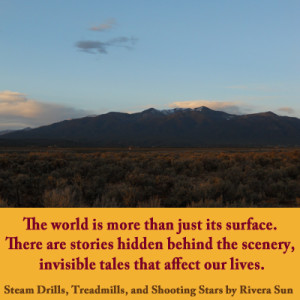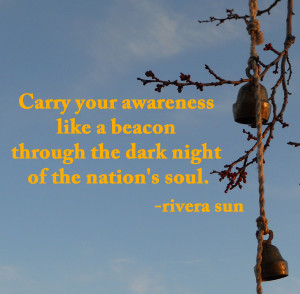There are subjects that break my heart and pull my pen toward them like gravity. The prison system is one of them. As a social protest novelist, I took my first novel, Steam Drills, Treadmills, and Shooting Stars, into the human impact of high incarceration rates and the policy effects of the private prison industry’s lobbying. Acknowledging the depth of suffering in the issues I explore in my novels alters the landscape of my soul. Learning about mountaintop removal, drone strikes, poverty, and prisons changes me irrevocably. After researching both the facts and the human truths, a pit remains inside me, a bombed out village, a mother crying over her child’s body, and millions of faces behind bars, watching me with burning eyes.

So, when Beau Hodai, investigative journalist and founder of DBA Press, began explaining some of the facts behind what is becoming known as “the prison-industrial complex”, he evoked in me the sea of faces that have no names – the millions of ordinary people whose lives are caught up in the net of injustice and corruption. As Beau speaks carefully about the connections between Arizona’s private prison industry, lobbyists, appointed judges, contracts, and policies, I am haunted by the human stories tangled in his information.
Investigative journalists and social protest novelists deliver a one-two punch to the story of our times. Beau delivers the facts; I deliver the intangible human truths. Together, we form a genre known as muckraking that operates within both journalism and fiction to bring public attention to issues of extreme injustice. When you fully grasp the sickening depravity of individuals profiting from the suffering of imprisoning millions of people, then Beau and I have both done our jobs. Each of us has our strengths. For instance, journalism will inform you that:
– There are 153 corrections facilities run by private corporations in the US.
– There are 1,571,013 prisoners in our state and federal prisons.
– Corrections Corporation of America made $1.7 billion in total revenue in 2011.
– Occupancy guarantee clauses in private prison contracts range between 80% and 100%, with 90% as the most frequent occupancy guarantee requirement. *

Meanwhile, a novel will bring to you the human stories, such as wrongful convictions ruining lives, twenty-hour bus rides to visit incarcerated family members intentionally sent to corrections facilities far away, the callousness of a system that spits out parolees who cannot get jobs and are branded for life by convictions, the social cost of imprisonment in terms of legal expenses, broken families, racial profiling and tensions, heartache and separation, and so on.
Beau has become an expert in strategies for filing public records and Freedom of Information Act requests to trace the intricate connections of policy, public funding, and corporate influence on politics around these issues. On the other side of the coin, I have become a repository for human experiences. My research took me, at one point, to support groups for wives of prisoners, where I discovered that my heroine’s experience of seeing her child’s father convicted just days before their son was born was not a wild imagining. It was – and still is – a devastatingly common occurrence.
Beau Hodai speaks with the precision of a lawyer. His writing is dense, in depth, and information-rich. In an era of sound bite journalism, Beau is an endangered species. There are only 400 Sumatran tigers left in the world . . . but I wonder if we even have that many investigative journalists left in the United States. In depth reporting plays an essential role in the ecosystem of truth, information, public awareness, and accountability. It would be a tragedy if they go the route of the Black Rhino, the dodo, or the passenger pigeon. The proliferation of superficial, shock-oriented corporate media tactics has already delivered serious blows to public understanding of issues.

Social protest novels, on the other hand, have an exciting opportunity before them. As we writhe in the midst of a second, more extreme Gilded Era, we are called to action like writers who came before us. The term, the Gilded Era, was coined by Mark Twain to describe the thin facade of gold that covered sordid squalor beneath it. Great American writers such as Upton Sinclair and John Steinbeck arose in this time, penning novels that shaped legislature and the direction of the nation. They bent their pens to the pressing issues of their days, leaving us a literary legacy that modern writers would be wise to emulate. Today, we have the tools of computers, online direct marketing to readers, electronic novels, independent publishing, on-demand printing, and crowd-funding – all of which give us unprecedented freedom of expression.
If we, as writers, do not apply our craft to addressing the dire problems our society faces, then we are eschewing our responsibility to all of humanity. No writer should remain silent, innocuous, or irrelevant at these times. The old adage of the pen is mightier than the sword is only true if we wield it with the ferocity and skill of the warrior. As our fellow journalists face severe restrictions and challenges, social protest novelists must come to their aid, using our ability to capture hearts and minds, and rallying people to strive for social change.
Author/Actress Rivera Sun sings the anthem of our times and rallies us to meet adversity with gusto. In addition to her most recent novel, The Dandelion Insurrection, she is the author of nine plays, a book of poetry, and her debut novel, Steam Drills, Treadmills, and Shooting Stars, which explores the prison system, mountaintop removal, and climate change.
Tune into Occupy Radio as co-hosts David Geitgey Sierralupe and Rivera Sun interview Beau Hodai on filing Freedom of Information Act requests, the private prison industry, and the impact of the surveillance state on journalism and activism. Listen Live on Wed, Dec 11th (7pm PST/10pm EST) here and join the live chat on the Occupy The Media Facebook page during the show. Can’t make that time? The podcast comes out on Sat Dec 14th on occupythemedia.podomatic.com.
For more on Beau Hodai’s work visit: http://www.dbapress.com where, among many other articles, you will find these two on the private prison industry and the influence of ALEC on public policy:
“A Case Study on CCA’s Web of Influence in Arizona: Mark Brnovich:”
http://www.prwatch.org/news/2013/09/12251/case-study-cca%E2%80%99s-web-influence-arizona-mark-brnovich
“Brownskins and Greenbacks: ALEC, the for-profit prison industry and Arizona’s SB 1070:” http://dbapress.com/front-page/brownskins-and-greenbacks-alec-the-for-profit-prison-industry-and-arizonas-sb-1070
* These statistics come from:
Bureau of Justice Statistics, “Correctional Populations In The United States, 2011”
http://www.bjs.gov/index.cfm?ty=pbdetail&iid=4537
Alternet.org “6 Shocking Revelations About How Private Prisons Make Their Money”
http://www.alternet.org/civil-liberties/6-shocking-revelations-about-how-private-prisons-make-their-money